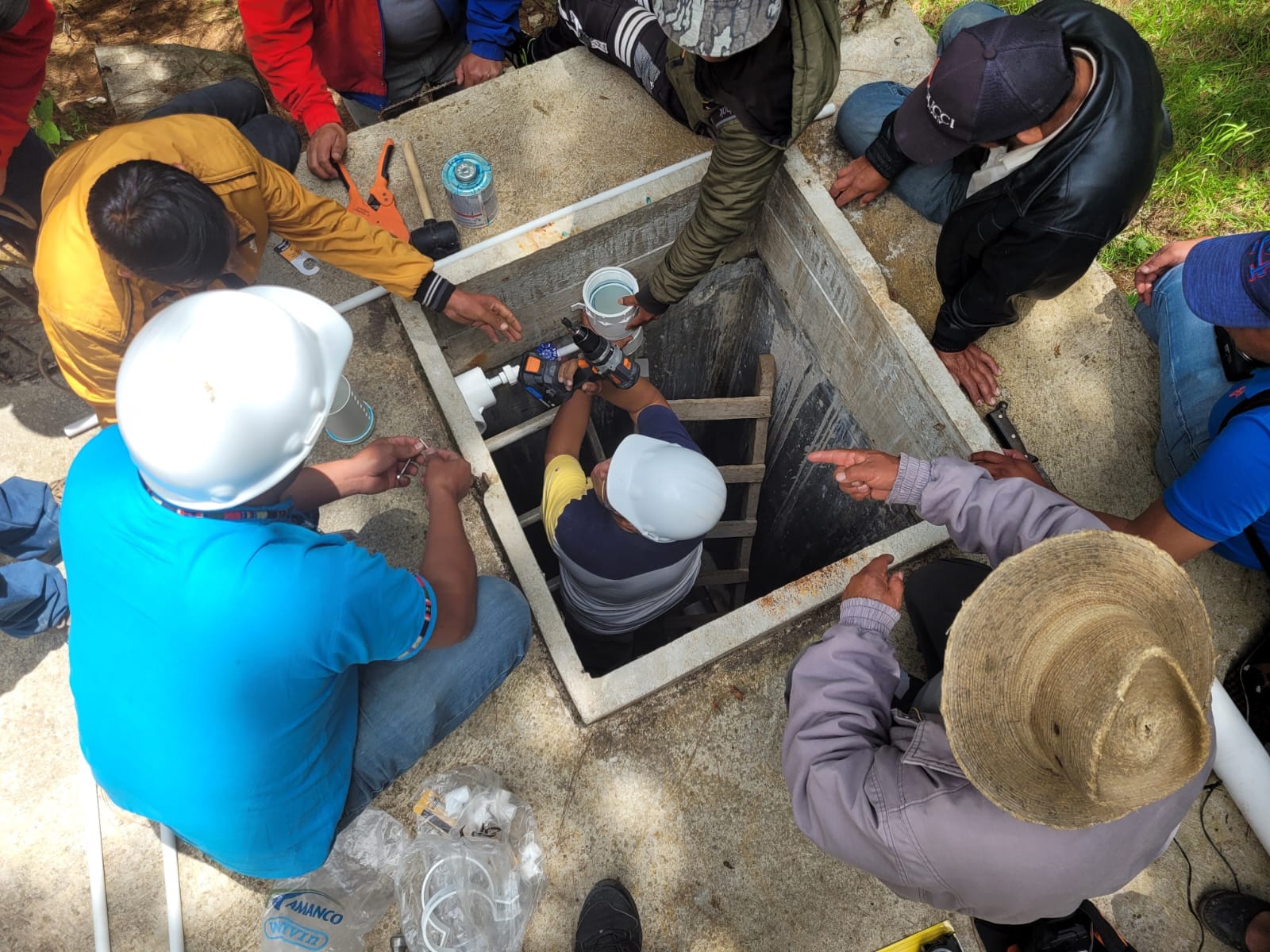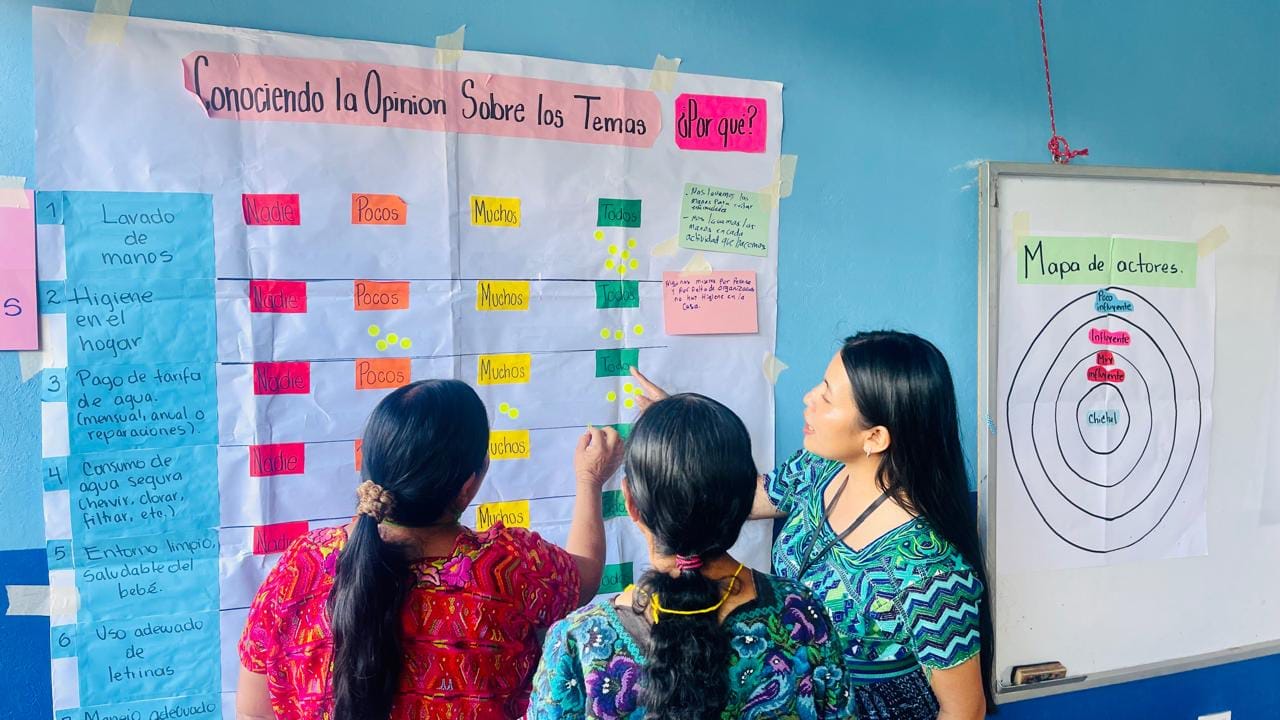News > Blog
Strengthening Partnerships and Governance for Sustainable WASH Solutions in Indigenous Communities: Deepening Our Understanding of Local Needs and Challenges
Published 10/10/2024 by Global Communities

By Gigi Dupuy & Marc Valentin
While most people have access to basic drinking water in Guatemala, many rural areas, especially those that are home to Indigenous Mayan communities, do not. In these communities, water is not just a resource but a sacred part of their culture and a living entity, influencing how they manage and protect it.
In addition to understanding the social, political, governance and economic factors that affect rural communities’ abilities to construct and maintain water systems, it is therefore crucial to understand and incorporate the Mayan cosmovision into any Water, Sanitation and Hygiene (WASH) or Water Resources Management (WRM) project in Guatemala.

I-WASH has developed strong partnerships with Indigenous communities and organizations by implementing through local Indigenous partners, engaging staff who speak the local languages, and creating spaces where community members can share their concerns and ideas about WASH and WRM challenges with rural water committees.
I-WASH centers its activities on supporting the municipal Offices of Water and Sanitation (OMAS) as well as the Municipal Forestry Offices (OFM) in their respective mandates to provide technical assistance and funding to rural communities, helping them gain access to safe drinking water and conserving critical forest natural resources that protect community aquifers and springs.
To ensure I-WASH incorporates the Mayan cosmovision of water into culturally sensitive activities, Global Communities conducted an in-depth study which analyzed Indigenous practices and customs regarding access, use, conservation and management of water resources. This study uncovered key insights that are shaping the project’s approach to program activities including local capacity building, WASH governance and service delivery.
As a Mayan K’iche’ woman, my grandparents taught me to take care of water because it is sacred… that water is life and without it, we could not survive.”
Catarina, I-WASH project participant, Quiché
For instance, Mayan clothing is traditionally brightly colored and highly symbolic. The study revealed that some communities are concerned that chlorinating water systems will fade their traditional garments. In response, I-WASH is developing key messages around the low concentration levels in chlorinated systems, which will not affect traditional garments.
Another finding was that the Mayan calendar includes important dates related to water and springs. To honor this, I-WASH implementing partners will organize community WASH/WRM activities on those dates. The study also highlights the fact that, in Mayan culture, communities manage their own water resources. Therefore, construction of any new wells or water systems must be decided collectively by the community.
By understanding these cultural nuances, I-WASH will be able to integrate Indigenous perspectives into project activities, assuring cultural relevance and a higher degree of acceptance and sustainability among Indigenous communities. The study led to the creation of a toolkit for organizations interested in incorporating the Mayan cosmovision into WASH/WRM activities through a community-based approach. This will be used to strengthen the capacities of I-WASH implementing partners and shared widely with other actors and stakeholders in Guatemala.
The study also emphasized the need to consider gender dynamics in WASH and WRM activities. It found that community water committees are typically made up of men due to traditional gender roles and the physical demands of maintaining water systems and wellheads. However, women are the main users of water and more knowledgeable about household water and sanitation needs and challenges. Additionally, many rural Indigenous women are hesitant to speak up in public due to social exclusion, machismo, language barriers and other reasons.

Photo by Ana Lucía Cano/Global Communities
To ensure women’s voices are heard in WASH/WRM decision-making spaces, I-WASH is helping Indigenous women develop skills in communication, conflict resolution, decision-making, time management and WASH topics, and encouraging them to join regular meetings of their rural water committee. In Quiché, women have started participating in these meetings on their own. In areas where there is resistance to women’s involvement, I-WASH will organize quarterly focus groups with women and the water committees to make sure women’s insights on water use and sanitation are included.
The study also highlighted the importance of engaging young people in WASH and WRM activities to help ensure the long-term sustainability of WASH services. In response, I-WASH is organizing youth in rural communities, teaching them about WASH/WRM topics, and involving them in project activities and events to boost their interest and participation in water resource management. By engaging youth, I-WASH not only addresses community needs but also builds the foundation for generational continuity in managing water resources.
Language was identified as a significant barrier to effective community engagement. A total of 22 Mayan languages are spoken in Guatemala, many of which are spoken in I-WASH communities. Since the project’s inception, I-WASH has prioritized the use of local Mayan languages, including Ixil, K’iche’, Uspanteko, Q’anjob’al, Mam and Chujal. By engaging volunteers from within these communities to assist with interpretation, the project is able to minimize language barriers and foster more meaningful participation in project activities. When working with groups of rural Indigenous women, female interpreters are used to help build confidence and trust during meetings and training sessions.
Guatemala’s new government has prioritized universal coverage of safe drinking water and improved rural sanitation. I-WASH offers a unique opportunity to ensure that Indigenous communities and organizations are strengthened and empowered to play an active role in ensuring their WASH and WRM priorities are met, while at the same time ensuring their customs, culture and cosmovision is respected and reflected in public service delivery.
In Guatemala, the road to sustainable WASH services in rural Indigenous communities requires a deep understanding of the needs of Indigenous communities and strong partnerships with local governments. By addressing cultural relevance, gender equity, youth engagement, and improving communication and coordination, the I-WASH project is laying the groundwork for lasting improvements in water resource management and access to safe drinking water and improved sanitation. Through these efforts, Global Communities is paving the way for a future in which WASH services are accessible to all, grounded in inclusivity and respect for local traditions.




